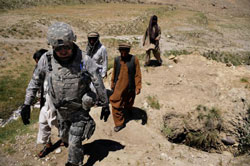 Wherever we can find a positive story about our military in action we should let others know. You’re sure not going to find it on mainstream media. This one is from the Army’s own website. This has also been done in Iraq and other countries. I think it’s good to point out how important agriculture is to a country and why we should be doing everything we can in this country to protect and build our own ag base. The loonies are sure trying to hurt it all they can though which is why I think they’re so un-patriotic. So let’s celebrate our fighting men and women who are helping another country build their ag base!
Wherever we can find a positive story about our military in action we should let others know. You’re sure not going to find it on mainstream media. This one is from the Army’s own website. This has also been done in Iraq and other countries. I think it’s good to point out how important agriculture is to a country and why we should be doing everything we can in this country to protect and build our own ag base. The loonies are sure trying to hurt it all they can though which is why I think they’re so un-patriotic. So let’s celebrate our fighting men and women who are helping another country build their ag base!
At war in a country that has been devastated by centuries of fighting, the U.S. military is committed to helping Afghanistan attain a functional level of prosperity and self-sustainability through improved agricultural methods.
Teams of National Guardsmen from Missouri and 11 other farm-belt states are deploying to Afghanistan on year-long tours to assist in this effort. The Guardsmen bring with them more specialized skills than those of the usual advisory panels that typically helm projects such as these. This mission calls for military members with expertise in farming, raising livestock and cultivating natural resources.
The U.S. military recognized the necessity of such teams in late 2007 when reconstruction teams realized people in rural areas needed something more pressing than a new school or road. Across Afghanistan, these teams have been inundated with requests for help with farming and other agricultural endeavors.
The Nangarhar Province Agri-Business Development Team has focused on facilitating sustainable projects that aid the Afghan people in a manner that results in greater impact and more long-term benefits.
“We have a wide-range of programs geared at helping the Afghan people gain better farming practices and that often means providing basic systems such as wells and karizes to irrigate the crops,” said Maj. Denise Wilkinson, ADT executive officer who is deployed from the Missouri Joint Force Headquarters. “We have projects with large budgets, but we have found that it’s the small projects at little cost that have the biggest impact on the people who need our help the most.”
